


aka aka
Source: novel
Ten Days' Wonder |
|
Time magazine, by J.C. May 15. 1972 "Out of Control 'This wonder, as wonders last lasted nine days.' intones Orson Welles in his best Eastern Airlines Wings-of Man voice. The image cuts abruptly from a black screen to Tony Perkins thrashing and twitching in bed. He is in the last throes, we learn later, of an uncongenial drug experience. His hands are drenched in blood - 'my blood,' Perkins sobs, although he does not seem to have even a minor contusion. Claude Chabrol, who excels at tightly disciplined exercises in suspense ('This Man Must Die', 'Le Boucher'), seems himself to be going momentarily delirious in 'Ten Days' Wonder', where tension and insight are subordinate to sorry stylistic flamboyance. Chabrol's camera swoops about like a dizzy flamingo, descending from great altitudes to light on such still lifes as a garden, a pond or two naked lovers entwined in the green leaves. The lovers are Charles and Helene (Perkins and Marlene Jobert), the adopted children of a dotty millionaire tyrant named Theo Van Horn (Welles). Papa has used his fortune to re-create meticulously the year 1925. 'It was an exciting time to be alive,' he explains over his nightly gourmet repast, glaring balefully around the table at anyone who might offer a contradiction. Charles has to romp about the estate in knockers, but takes some solace in sculpting huge, brooding Olympian figures. Helene is something of a stiff, a quality convincingly conveyed by Miss Jobert, who shuffles through the film in a state of saucer-eyed rigor mortis. Also on hand is an intellectual friend of Charles called Paul Regis (Michel Piccoli), who lacks the brains to get out while the going is good. Charles and Helene confess their passion to him, and Regis receives the news with equanimity. He even helps the lovers deal with a blackmailer and generally tries to ease a situation further complicated by the fact that Helen is also Papa's wife. It all leads to murder, which is only to be expected from a film that is adapted from an Ellery Queen novel. There is a also a great deal of cosmic chatter about guilt, punishment and redemption. 'Ten Days' Wonder' exudes a sort of occluded Catholicism, a quality that the young Chabrol detected in the work of Hitchcock, who has been a heavy and not entirely salutary influence on him. Everything is rather uninterestingly out of control here, including Orson Welles. When Welles arches an eyebrow he undergoes such convulsions that it appears he is trying to launch a great hairy boomerang off his face into the stratosphere." |
| In this ponderous French crime thriller, based on an Ellery Queen story, blackmail would seem to be the least of the problems of Charles. His adoptive father Theo has a madwoman for a mother, and a gorgeous woman of Charles' age for a wife. In fact, Charles is deeply attracted to her. In addition, his father encourages the whole family to dress in '20s clothing, which makes them all feel out of place. However, when he wakes in a strange bed with blood on his hands and no memory of anything the night before, he gets a little bit frantic. He calls Paul, his old professor of philosophy, one of the few non-family members he can trust for discreet help. Theo has made his country estate into an eerily independent universe, not like anyplace else. Paul accompanies Charles to the father's strange home, and uses his philosophical training to try to solve the mystery of the bloody hands. |
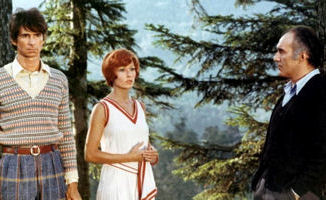 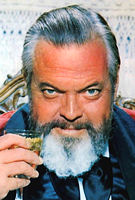 |
|
Above left: Anthony Perkins, Marlène Jobert and Michel
Piccoli. Above right: Orson Welles. |
| Ellery Queen meets Claude Chabrol in erratic but moody mystery. The film doesn't work, but is often fascinating to watch. Possibly the weirdest EQ adaptation of all, this one wrenches the tale out of Wrightsville and into French wine country. Ellery isn't in the film at all, replaced by "Paul Regis", and the whole thing is an bizarre, incoherent miss-mash. Costumes suggest the 1920s, but the time is the present. The plot of the book is fairly well duplicated (with one or two significant alterations that are not beneficial) but the many obscurities and the atrocious dubbing make this a disastrous farewell to the big screen for Ellery (who's probably glad he wasn't even in it!) |
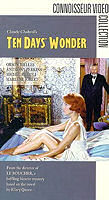 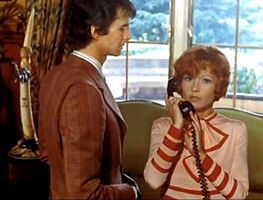 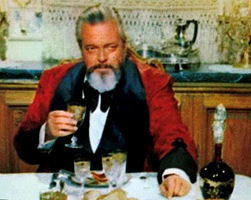 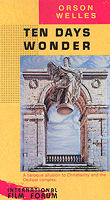 |
|
Filmmakers Newsletter, November 1972
"TEN DAYS WONDER. France. Dir: Claude Chabrol. This time Chabrol has definitely overreached himself. Elegantly composed, but lacking the balance of LES BICHES or LE BOUCHER: a creakingly over-elaborate Ellery Queen plot, Anthony Perkins yet again in the role of a young psychopath, and Orson Welles flourishing in his usual megalomaniac splendor as an Olympian father-figure. Worth seeing for ravishing camerawork in even the most trivial scenes." Film Information, by B.M.R. - June 1972 "Admirers of 'La Femme Infidel' and 'Le Boucher' will be disappointed by 'Ten Days’ Wonder'. Chabrol’s latest work lacks the intellectually stimulating clarity of concept and the warming compassion of the earlier films. Again Chabrol is occupied with interactions among people in a decadent setting, and again the plot is complex. But the complexities this time are convoluted rather than subtle. The story concerns a disturbed young man (Anthony Perkins), a former professor of his (Michel Piccoli), Perkins’ stepmother (Mariene Jobert), with whom he is having an affair, and his wealthy adoptive father (Orson Welles), a monstrous father figure. Perkins, waking from a siege of amnesia, becomes deeply afraid he may kill someone. Someone is murdered, and the professor uses Ellery Queen— style sleuthing to unravel the mystery. But the mystery remains obtuse, including various references to the breaking of the Ten Commandments." |
| (Source Trailer YouTube) |
|
Other articles on this movie (1) IMDb (2) La decade prodigieuse Full movie Daily Motion |
|
Copyright © MCMXCIX-MMXXII Ellery Queen, a website on deduction. All rights reserved. |